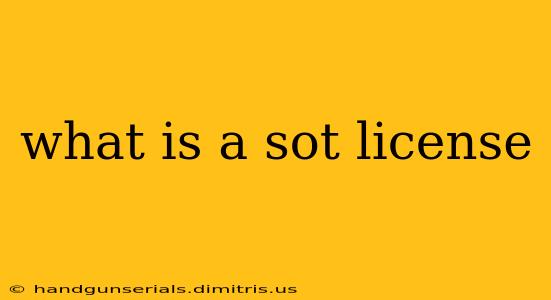The term "SOT license" stands for Site-of-Treatment license. It's a crucial concept in the healthcare industry, particularly relevant for manufacturers and distributors of medical devices and pharmaceuticals. This post will clarify what a SOT license is, its implications, and why it's important for both businesses and patients.
What Does a Site-of-Treatment License Entail?
A SOT license isn't a single, universally defined legal document. Instead, it represents the authorization granted to a specific healthcare facility (the "site of treatment") to use, possess, or distribute a particular medical product. This authorization is often tied to specific regulatory requirements and can vary significantly depending on the product, the country, and the applicable laws.
Think of it this way: a manufacturer creates a drug. To legally use that drug in a hospital, the hospital might need a SOT license from the manufacturer. This license doesn't transfer ownership of the drug; rather, it grants permission to use it within the confines of that specific location and often under specific conditions.
Key Aspects of SOT Licenses:
- Product-Specific: A SOT license is typically tied to a specific medical product. Licensing for one drug or device doesn't automatically extend to others.
- Location-Specific: The license usually covers a single site of treatment, meaning a specific hospital, clinic, or other healthcare facility. Using the licensed product at another location would likely be a violation.
- Conditions of Use: The license might include specific stipulations on how the product can be used, stored, and disposed of. These conditions can be crucial for safety and regulatory compliance.
- Compliance and Oversight: Maintaining compliance with the terms of a SOT license is paramount. Failure to do so can lead to penalties, including legal action.
- Regulatory Alignment: SOT licenses often intertwine with broader regulatory frameworks, like those governing pharmaceutical or medical device usage in a given jurisdiction.
Why are SOT Licenses Important?
SOT licenses play a critical role in ensuring:
- Patient Safety: By controlling the distribution and use of medical products, SOT licenses help ensure that these products are handled and administered correctly, thereby minimizing risks to patients.
- Product Quality: The conditions outlined in a SOT license can help maintain the integrity and effectiveness of the medical product throughout its lifecycle.
- Regulatory Compliance: These licenses are essential for demonstrating compliance with relevant health and safety regulations. This compliance safeguards both the healthcare facility and the manufacturer.
- Liability Management: Proper licensing procedures can help mitigate liability issues related to the use of medical products.
SOT Licenses vs. Other Licenses
It's important to differentiate SOT licenses from other licensing models in healthcare, such as:
- Manufacturer's Licenses: These licenses allow a company to manufacture and distribute a product.
- Distributor Licenses: These authorize a company to distribute a product, but not necessarily use it.
- Import/Export Licenses: These licenses permit the movement of regulated goods across international borders.
A SOT license operates on a more granular level, focusing specifically on the authorized use of a product within a single healthcare facility.
Conclusion: Understanding the Importance of Site-of-Treatment Licenses
Understanding SOT licenses is crucial for navigating the complexities of the healthcare industry. Whether you're a medical device manufacturer, a healthcare provider, or simply a curious patient, grasping the implications of these licenses helps promote patient safety, regulatory compliance, and the overall effectiveness of medical treatments. Always consult with legal and regulatory experts for guidance specific to your situation and location.

